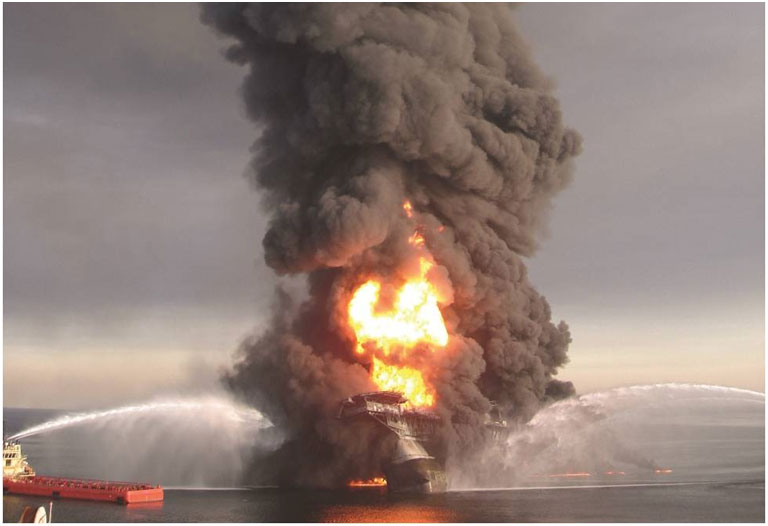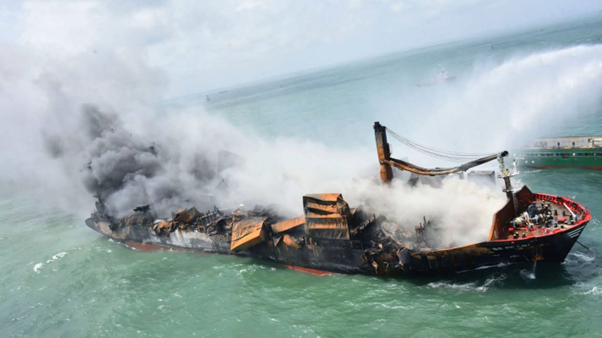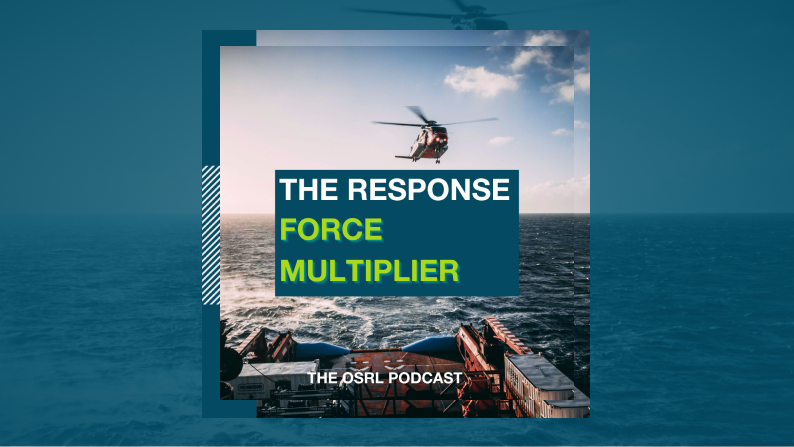Remote, Low Carbon, Efficient. Responding to oil spills in a post pandemic virtual world.
The perceived wisdom is that we cannot make the right decisions without boots on the ground. Around the world corporations and individuals are being challenged to reduce their carbon footprint and international air travel is a key focus.
Many assume that an Incident Commander needs to be close to an oil spill incident if they are to manage it properly. Much like a general travelling with their troops or a fire-chief directing operations at the scene of a fire. There are many good reasons for this; short communication lines, improved situational awareness and the positive impact on morale having a leader beside you offers.
Conversely, however, the campaigning of Greta Thunberg and new groups such as Climate Rebellion, as well as established green agenda organisations like Greenpeace and Friends of the Earth, are lobbying for reductions in the use of non-renewable energy.
Pre COVID-19, had we lost the "prudent" from the policy of prudent over-response?
For the avoidance of doubt, the authors would always support a "no regrets" policy of prudent over-response to incidents. Experience shows that strong early intervention delivers the best results for the environment. It is, however, possible that at times this principle can be taken too far; with command centres employing more personnel than are out in the field responding to the incident. We could question whether a self-sustaining frenzy of command post personnel improves the clean-up efficiency. The same often applies to company exercises, especially those involving the regulators where the desire to ace the exam may lead to an over-large command team.
The COVID-19 pandemic has severely limited air travel, and this has forced us to be inventive about how we may support an incident remotely
During the COVID-19 pandemic, the Oil & Gas industry has found many ways to keep their operations running even though the levels of international travel are currently close to zero.
In the world of incident response, we have found ways to meaningfully exercise and respond if needed, in a remote manner. In some instances, it is arguable that the removal of a one to two-day hiatus while an incident team travels out to manage the situation has improved efficiencies.
Can we apply the remote working solutions we have found during the pandemic to a post-COVID-19, low carbon, world?
As restrictions on international travel are relaxed both at a corporate and a governmental level, should we return to the old model of incident response or is now the time to re-think?
Working through the pandemic has challenged many paradigms, and it may be that it is time to consign the B-movie image of the cavalry riding over the hill to save the day to the cutting room floor.
If we can get just four things right, then remote incident management could become a reality
1. Do believe the hype!
The latest software communication tools position themselves as collaboration platforms. Generally, we have not used these tools as any more than email or video call platforms, but the lockdown has forced many of us to use them to their full potential. We have now explored to the full the ability to collaborate real-time on documents, see what someone else is seeing the other side of the world and share gigabytes of information even over relatively weak internet connections. There are challenges in extending the access to these platforms outside any given organisations. Our IT security policies can make sharing difficult, but with the creation of a virtual "cordon sanitaire," it is by no means impossible.
Response organisations and other contractors working within these structures will have to be platform agnostic; able to work with multiple different systems for online collaboration to be efficient and effective.
Experience over the last four months has taught us valuable lessons here; every exercise has brought us different platforms, architectures and varying levels of confidence from the client in their use. None of these challenges, however, have been insurmountable.
In summary; the claims software vendors are making about their products do stand up. Emergency Operations Centres can work in the virtual world.
2. Seeing with others' eyes
While we still believe that there is no substitute for an experienced observer in an aeroplane being physically there to report on an oil spill, we can still get excellent insights without leaving home. Video taken by others or even by drone; if well directed can give much of what that trained observer can offer. We believe that we are close to being able to quantify oil spills via an Unmanned Aerial Vehicle (UAV). With telemetry to report field of view and some other software augmentations, a trained observer could soon be able to review UAV footage from the comfort of their sofa and give a spill quantification estimate.
Coupled with satellite (microwave and visual), Infra-Red (IR) and Ultra Violet (UV) aerial platforms, press and social media photographs, we can form an accurate picture of the situation in-field. Equally, local sensitivities can be gauged through these media and via previous GIS mapping. It seems almost nowhere in the world does not have some form of GIS mapping today, and even imagery from Google Earth can help.
While maybe using many more data points than previously to achieve the same end; we can achieve good situational awareness without getting on board any aircraft.
3. Collaborate, don't Compete
Around the world, many regional and sub-regional organisations that operate in the incident management space exist. It may not be their prime role; many are industrial cleaning and supply logistics companies first and response organisations second. Nonetheless, they have the right background to support an incident response in the field and allow the global organisations to operate vicariously through their partners. In some cases, we potentially have work to do in establishing common standards and alignment on incident management strategies, but once reassured of the good intentions of "big brother" most local organisations are happy to participate.
A buddy system of a remote expert guiding a well-trained local responder with a camera and phone can work well as long as there is connectivity.
4. We'd love to help but...
Generally speaking, where there is one oil company, there will be others, because there will be multiple blocks with good oil prospects in the same country. Each of these companies has well-trained personnel who could assist each other in the event of an incident. Indeed in many countries, there are mutual aid agreements or at least industry forums where Health, Safety and Environment and Emergency Response lessons are shared. Sometimes a concern about liabilities from one side and fears about confidentiality from the other have prevented personnel from one company assisting with another company's incident. Post Macondo, much work has been done to overcome these issues through IOGP, IPIECA and locally. While arguably there is work still to do in the mutual aid space, the force-multiplier effect if this lands correctly is enormous.
Is It Time To Say "Goodbye" To the Cavalry?
So, do we still need teams of oil spill professionals at the incident locations to deliver a response? Or is it time to put away our frequent flyer cards and settle into a new normal of working from home? Well, maybe not just yet; there are still good reasons to have a physical presence in field.
There is still no real substitute for an experienced observer providing aerial surveillance reports and for specialists on the ground to make shoreline assessments.
Specialist equipment needs to be deployed by experienced personnel familiar with its operation. Maintaining these levels of competence in every location around the globe is not a cost-effective nor a practical option. Without regular exposure to real oil spills, all the exercising in the world will not hone this expertise properly; the need for central company teams and global Oil Spill Response Organisations remains.
Making things happen in the Emergency Operations Centre is so much harder virtually. While we can see each other, nuances of body language and a lack of eye-to-eye contact as our cameras and our screens do not align mean that we may not fully understand each other in times of stress. In the virtual world, the side-bar water cooler conversations which often act as the oil in the engine of a response are missing.
Reputationally it may not play too well that corporate response teams remain remote and that global experts are advising from afar. Without a physical presence at an incident site, there could well be headlines about how the company has "abandoned" its affiliate and "doesn't care" about the incident or the country it occurred in.
Nonetheless, the experiences of lockdown mean that we certainly can reduce our carbon footprint in the event of an incident even if we can't remove it altogether.
Furthermore, the virtual platforms allow our interventions to start at hour zero, meaning that our actions can have a positive impact sooner. Early, remote intervention will bridge a crucial time gap which is often present as strike teams travel out to the incident location.
Time is key to protecting the environment, and an agile approach to a blended remote and in-theatre response model will deliver positive results.
We've got you covered!
Wherever in the supply chain your oil spill risks lie, we are ready to respond with our expertise and resources anytime, anywhere with our Member Response services.








